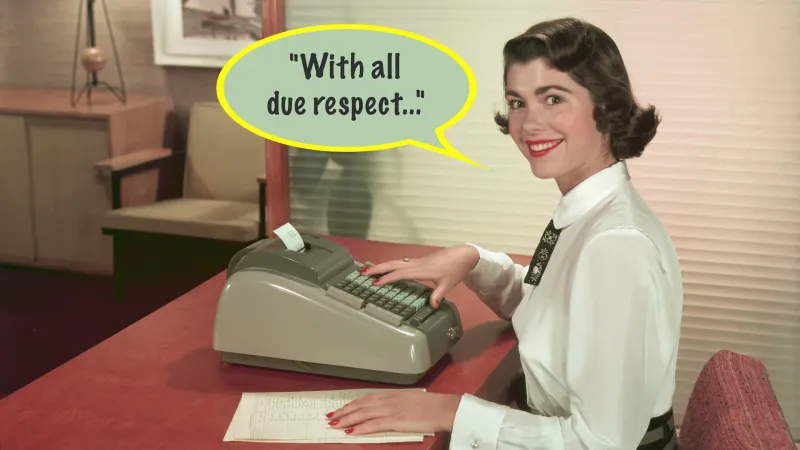21 Words And Phrases Smart People Never Use
Words have power, and choosing them wisely can make all the difference in communication. While we all strive to sound intelligent and articulate, some words and phrases can undermine our efforts.
This article explores 21 expressions that smart people avoid using. Each entry is a reminder that clear, empathetic, and precise language is the hallmark of intelligence.
Dive into a world where words are more than just sounds—they’re tools for building bridges, not walls. Let’s explore language that might sound smart but often falls short.
1. That’s just how I am

“That’s just how I am” is a phrase often used to resist change or personal growth. While everyone has inherent traits, using this phrase can signal a reluctance to adapt or improve. It suggests that the speaker is unwilling to take responsibility for their actions or consider others’ perspectives.
This mindset can hinder personal development and professional relationships. Instead of using this phrase, one might consider expressing a willingness to learn and grow. Showcasing adaptability and openness can lead to more enriching interactions and opportunities.
In settings that value collaboration, demonstrating a flexible attitude is an asset. Remember, growth often begins with the willingness to change.
2. I know everything about this

Claiming “I know everything about this” can backfire, painting the speaker as arrogant or closed-minded. In reality, true experts recognize the vastness of any field and their continual journey of learning. This phrase can alienate others, stifling dialogue and collaboration.
Smart communicators acknowledge their knowledge while remaining open to new ideas and perspectives. An approach that encourages questions and discussions is more effective.
A willingness to admit what one doesn’t know can foster trust and invite shared learning experiences. It’s a reminder that intelligence isn’t about knowing everything, but about being open to discovering more.
3. You wouldn’t understand

“You wouldn’t understand” dismisses the listener, implying they’re incapable of comprehension. This phrase can create a barrier, suggesting superiority rather than inclusivity. It often shuts down conversations, alienating those who might have valuable insights.
A more productive approach invites discussion and questions. Encouraging others to engage with the topic fosters a sense of collaboration and respect. By avoiding this dismissive phrase, speakers can build bridges instead of walls.
Effective communication thrives on inclusivity and openness. Embracing diverse perspectives enriches the dialogue and broadens understanding. Remember, it’s not about who understands less, but how much more we can all learn together.
4. With all due respect…

The phrase “With all due respect” often precedes a statement that lacks respect. It’s a preamble that can signal disagreement or criticism, often perceived as insincere. When used inappropriately, it can come across as condescending.
Effective communication focuses on honesty and clarity without the need for such qualifiers. Instead of signaling respect with words, it’s better demonstrated through attentive listening and constructive feedback.
Choosing to engage in discussions with genuine respect and openness can transform the dialogue. Words should bridge understanding, not create contention. Remember, respect isn’t about the words we use but the actions we take.
5. It’s not my fault

“It’s not my fault” often shifts blame rather than seeking solutions. This phrase can reflect a lack of accountability, creating a barrier to resolving issues effectively. Highlighting faults without contributing to resolutions can hinder progress in personal and professional settings.
Acknowledging one’s role, even in shared challenges, fosters a spirit of cooperation and problem-solving. Instead of deflecting responsibility, focusing on actions that move forward is more productive.
A culture of accountability enhances teamwork and trust. By embracing responsibility, individuals demonstrate leadership and integrity. Remember, solving problems often begins with recognizing one’s part in the situation.
6. That’s not my job

The phrase “That’s not my job” can hinder teamwork and foster a lack of cooperation. It suggests an unwillingness to help others or contribute beyond assigned duties. In dynamic environments, flexibility and collaboration are key to success.
When faced with tasks outside one’s usual role, consider viewing them as opportunities for growth and learning. Embracing challenges with a positive attitude can enhance skills and relationships.
Being adaptable and supportive in a team environment fosters a culture of mutual aid and innovation. It’s not just about fulfilling roles but about contributing to a shared mission. Replace rigidity with a willingness to engage and grow.
7. I don’t care (when they clearly do)

Saying “I don’t care” when clearly invested can come across as disingenuous. It may indicate an attempt to hide vulnerability or a fear of judgment. This phrase can undermine genuine emotions and mislead others about one’s true feelings.
Authenticity enhances communication and builds trust. It’s important to express genuine emotions rather than masking them with dismissive phrases. Acknowledging feelings can lead to more meaningful interactions and understanding.
Honesty in communication fosters deeper connections. Being open about one’s emotions helps create a supportive environment where individuals feel valued and heard. Remember, it’s okay to care and show it too.
8. Let me play devil’s advocate…

“Let me play devil’s advocate” can suggest a desire to provoke rather than contribute constructively. While challenging ideas is valuable, this phrase can imply argument for the sake of argument, rather than genuine inquiry.
Constructive criticism should focus on enhancing understanding and exploring alternative perspectives. Presenting challenges thoughtfully, without this preface, can encourage open dialogue and innovation.
It’s important to distinguish between seeking truth and simply contradicting. A more effective approach involves asking insightful questions that deepen the discussion. Encouraging diverse viewpoints enriches the conversation and fosters a culture of critical thinking.
9. You’re too sensitive

Telling someone “You’re too sensitive” can dismiss their feelings and invalidate their experiences. It often suggests that the speaker values their perspective over the listener’s emotions. This phrase can create distance and discourage open communication.
Understanding and empathy are essential for meaningful interactions. Acknowledging others’ feelings and engaging with them genuinely can strengthen relationships. Instead of this dismissive phrase, try asking questions and showing support.
Valuing emotional responses fosters an environment of trust and respect. Embracing sensitivity as a strength enhances connection and understanding. Remember, empathy is a cornerstone of intelligent communication.
10. Everyone thinks so

“Everyone thinks so” is a phrase that can overstate consensus and stifle individual opinions. It suggests a pressure to conform, assuming agreement without evidence. This can discourage diversity of thought and suppress unique perspectives.
Encouraging individual voices enhances richer discussions and innovative solutions. Instead of assuming agreement, inviting others to share their thoughts creates a more inclusive atmosphere.
Challenging the idea of unanimity opens the floor to diverse insights. By valuing each person’s perspective, communicators foster a culture of respect and creativity. It’s about recognizing the strength in diversity rather than the illusion of consensus.
11. I’m just being honest (before being rude)

“I’m just being honest” often precedes comments that are less about honesty and more about insensitivity. While honesty is important, it’s equally crucial to consider how it’s delivered. This phrase can be used as a shield for rudeness, neglecting the impact words can have.
Crafting messages with care reflects emotional intelligence. Balancing honesty with kindness ensures that truth doesn’t harm relationships.
Effective communicators find ways to express truth while still valuing others’ feelings. It’s the delivery, not just the message, that defines respectful communication. Honesty doesn’t have to hurt; it can enlighten and uplift when shared thoughtfully.
12. It’s just common sense

“It’s just common sense” assumes that knowledge is universal, which can undermine others’ experiences and understanding. This phrase can create a sense of inadequacy, implying that someone should know something inherently.
Acknowledging that different backgrounds and experiences shape understanding is essential for effective communication. Rather than dismissing others, offering explanations can bridge knowledge gaps.
Promoting a culture of learning and patience encourages growth and mutual respect. By avoiding this phrase, communicators can foster an environment where questions are welcomed, and learning is a shared journey. It’s about embracing diversity in thought and experience.
13. This might be a dumb question…

Saying “This might be a dumb question” often undermines one’s confidence and preemptively devalues the inquiry. In a learning environment, every question is valid and contributes to broader understanding. Using this phrase can discourage engagement and stifle curiosity.
Encouraging a culture where questions are welcomed without judgment creates a supportive learning space. It’s important to remember that asking questions is a vital part of gaining knowledge.
By valuing each question, communicators can foster an atmosphere of openness and inclusivity. Confidence in inquiry leads to richer discussions and shared wisdom. No question is “dumb” when it facilitates learning and growth.
14. I guess I’m just different (used as a defense)

“I guess I’m just different” is often used defensively to dismiss others’ opinions or avoid addressing issues. This phrase can imply that the speaker values their uniqueness over understanding, creating barriers to communication.
Celebrating individuality is important, but so is engaging with diverse perspectives. By opening up to dialogue, individuals can find common ground and foster connection.
Effective communication involves balancing individuality with a willingness to engage with others. It’s about understanding differences, not using them as a shield. By embracing diversity and dialogue, communicators can create richer, more inclusive interactions.
15. I can’t do anything about it

“I can’t do anything about it” often signals defeat rather than the resilience smart people typically embrace. When uttered, it suggests a lack of control and responsibility avoidance.
In contrast, leaders and innovators seek solutions, demonstrating adaptability and a proactive mindset.
Moving past this phrase encourages a problem-solving attitude, fostering growth. Choosing empowering words transforms obstacles into opportunities, showcasing determination.
An influential communicator inspires confidence by addressing challenges head-on rather than dwelling on limitations. This shift in perspective not only impacts personal success but also influences those around them, cultivating an environment of possibility and progress.
16. That’s impossible

“That’s impossible” can stifle creativity and innovation, a stark contrast to the mindset of smart people who often see possibilities. This phrase can discourage and halt progress before an idea has a chance to flourish.
Embracing challenges with an open mind transforms the seemingly impossible into achievable goals. Smart individuals harness creativity, fostering environments where ideas can grow.
By replacing limiting beliefs with curiosity, the path to innovation widens. Efforts to use encouraging language propel personal and collective growth, sparking inspiration. Turning impossibilities into milestones redefines potential, motivating others to explore uncharted territories.
17. Calm Down

Ever been told to “calm down” in the heat of a moment? It’s often more infuriating than calming. This phrase can trivialize someone’s feelings, making them feel unheard. Instead of soothing, it adds fuel to the fire, highlighting a lack of empathy.
Smart communicators choose words that validate emotions. Expressing understanding can do wonders. A simple “I see you’re upset, let’s talk” can be transformative.
Remember, words can either bridge or break communication. Avoiding “calm down” in tense situations opens pathways to understanding and resolution.
18. You Always…

The phrase “you always” is a conversation killer. It paints the other person into a corner, suggesting inflexibility and judgment. This sweeping generalization can stop productive dialogue in its tracks.
People thrive on being understood, not boxed into absolutes. Offering specific examples instead fosters better communication. It shows openness and willingness to engage honestly.
Replacing “you always” with concrete observations can transform discussions. It allows for growth and understanding rather than defensiveness and conflict. Aim for clarity, not confrontation.
19. You Never…

Saying “you never” is a surefire way to escalate tension. It accuses and exaggerates, often distorting the truth. This phrase tends to overlook instances where the opposite is true, causing unnecessary friction.
Effective communicators focus on specific behaviors. Highlighting particular instances can open dialogue, encouraging cooperation and empathy.
Switching from “you never” to “I feel… when” promotes understanding. This subtle shift invites more constructive exchanges rather than blame, allowing for mutual growth and respect in relationships.
20. Whatever

The word “whatever” often signals disinterest and dismissal. It can end conversations abruptly, leaving others feeling undervalued. This indifferent attitude can erode trust and rapport over time.
Choosing words that convey interest and care makes a significant difference. Asking questions or offering supportive comments can enhance relationships.
Avoiding “whatever” opens doors to meaningful interactions. It demonstrates a willingness to engage, fostering an environment of mutual respect and understanding. Show you care, and reap the benefits of enriched communication.
21. I Told You So

“I told you so” is a phrase most often met with eye rolls and frustration. It’s a verbal pat on the back for the speaker, but it’s counterproductive for everyone else.
Smart individuals recognize the value in fostering growth rather than rubbing mistakes in others’ faces. Encouraging reflection without judgment can build stronger bonds.
Choosing encouragement over smugness leads to more positive interactions. It paves the way for a culture of support and development, rather than resentment. Let go of “I told you so” and embrace constructive communication.







